From 2h ago
Johnson claims Covid and cost of living crisis have boosted case for overhaul of 2019 Northern Ireland protocol
Here are some more lines from Boris Johnson’s article this morning in the Belfast Telegraph.
Every unionist representative campaigned against the protocol, as currently constituted. More importantly, every party, across the divide, seeks mitigations and change. None support a zealous zero risk approach to its implementation.
Many things have changed since the protocol was agreed. It was designed in the absence of a Trade and Cooperation Agreement and when it was unclear one would be agreed. It has not been adapted to reflect the realities of the TCA.
It was designed before a global pandemic and a European war which has created a cost of living crisis on a scale not seen for half a century.
For there even to be a question about the fast availability of medicines or medical testing in Northern Ireland (between two constituent parts of the same National Health Service) is incompatible with the post-Covid era.
For the chancellor of the exchequer to say in his spring statement that people in Northern Ireland could not be granted the same benefits in terms of tax and VAT as those in the rest of the same country is a serious issue. It means that our ability to assist with post-Covid recovery and — moreover, the long-term economic development of Northern Ireland — is restricted.
So I want to repeat my congratulations to Sinn Fein as the largest party. Respect for the rights and aspirations of all communities are an essential part of the Belfast Good Friday Agreement.
And I think it is testimony to the path that Sinn Fein have taken from 1998 that Michelle O’Neill is now awarded the position of First Minister. I have no doubt we will work together well.
Taken together, what the election results tell me is that the basis for successful power-sharing and stability is actually enhanced. Whichever way you cut it, there is a large majority for making Northern Ireland work.
Nor is there some perfect constitutional clockwork version of how the Union should be. Northern Ireland has always been a place in its own right, in which governance has been contested, broken, re-imagined and carefully nurtured.
Those arrangements continue to evolve. And far better, I think, is the Northern Ireland of today in which people look any way they want (north-south, east-west, or both) — depending on their identity, and their family, and their economic interests.
In today’s debates about Brexit and the Protocol, let us embrace that hybridity. Let us make it work.
More than 8,000 people have arrived in the UK this year after crossing the Channel in small boats, PA Media reports. PA says:
Since the start of 2022, 8,393 people have reached the UK after navigating busy shipping lanes from France in small boats, according to analysis of government data by the PA news agency.
This is more than double the number recorded for the same period in 2021 (3,112) and more than six times the amount recorded at this point in 2020 (1,340).
Crossings resumed this weekend, with more than 600 people arriving in Kent over two days, after four consecutive days last week without any taking place amid poor weather conditions.
Some 436 people made the crossing to the UK in nine boats on Sunday after 167 in 13 boats arrived on Sunday, according to Ministry of Defence (MoD) figures.
The latest crossings come after the department said it had started to tell the first asylum seekers they could be flown to Rwanda under its new deportation plan, with flights expected to begin in “the coming months”.
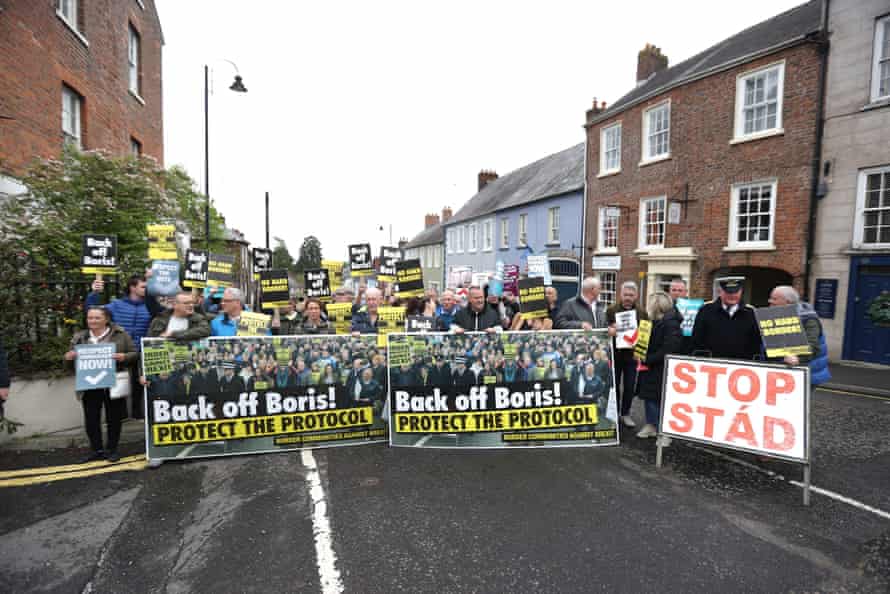
Starmer says as soon as police reopened Beergate investigation he knew 'deep down' he would have to promise to resign if fined
Here is the key line from Keir Starmer on Beergate in his Loose Women interview.
My instinct, as soon as I knew that Durham [police] had decided they were going to reopen this investigation, in my heart I knew what I was going to say, which is if I’m wrong, and they find I have broken the law, then I’ll do the right thing and step down ... I’m trying to make a bigger point here ... which is trust in politics; the number of times I hear ‘You’re all the same, you won’t do the right thing’ ...
As soon as I knew there was a reinvestigation, I knew I was going to say that [that he would resign if he was fined] because that was so deep down inside me as to what I believed, in that there was no way I wasn’t going to say that.
Starmer, who also stressed in the interview that he did not break the rules, clearly feels the need to say this because last week, when he did announce that he would resign if fined by Durham police, there were reports that he had hesitated before making this pledge because of the obvious risk.
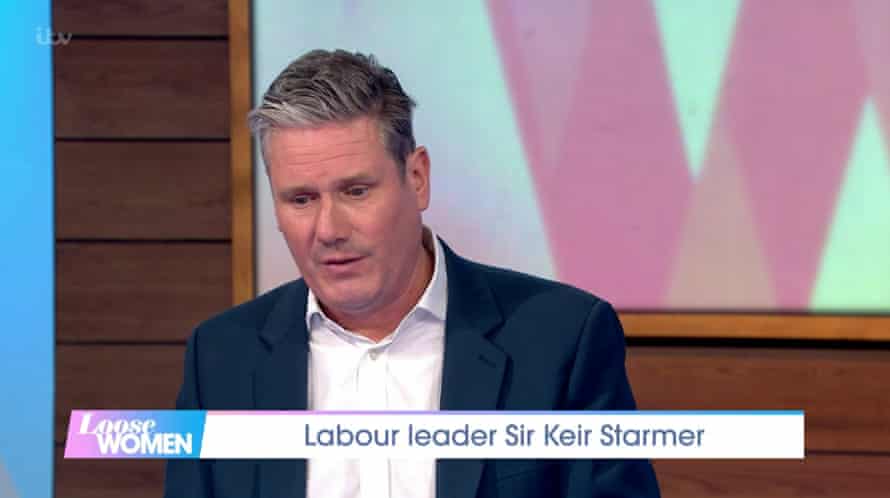
Starmer is now talking about his mother, and Still’s disease, the form of arthritis she had. He says she was diagnosed at the age of 11. At that point she was told that by the time she was in her 20s, she would stop being able to walk. But she was treated with steroids, which was experimental for people her age, and she was very determined. She went on to have four children, he says.
Starmer says he wants to show that all politicians are not the same.
He repeats the point about how, as soon as he heard Durham police were reopening the investigation into Beergate, he knew he would have to resign if he was fined because “deep down, inside me” he felt it was important to show this was a matter of honour.
Starmer questioned about Beergate on ITV's Loose Women
Keir Starmer is being interviewed on ITV’s Loose Women. The programme is having an arthritis week, and Starmer has been invited on because his mother had the illness.
But the first questions are about Partygate and Beergate.
Q: A poll yesterday said 63% of voters thought you were a hypocrite?
Starmer says he has been very clear he has not broken the rules. But he says, if he is fined, he will resign.
Q: But you said Boris Johnson should resign when the police started their investigation.
Starmer says at that point there had already been industrial-level rule breaking in No 10.
Q: You had a meal for about 30 people.
It was not 30 people, says Starmer. It was nearer 15 people. He says they were on the road. They had to eat. He always travels with a team.
Q: But you have been hoist with your own petard. You were so noisy about Partygate this has hit you in the face.
Starmer says they were on the road. Someone had to organise food. That is what happens when politicians are travelling.
Q: Are you worried about having to resign?
Starmer says he has not broken the rules.
But he says, when he heard he was being investigated, he knew that he had to say he would resign if fined.
Ciaran Martin, a professor at the Blavatnik School of Government at Oxford University, has an interesting Twitter thread on Boris Johnson’s Belfast Telegraph article. It starts here.
The PM’s article on Northern Ireland in @BelTel could be significant, depending on what the Gov’t does subsequently, which could render it irrelevant. But it’s a serious piece of work that deserves attention, so in the meantime, some thoughts 1/8https://t.co/RNofIjmyEb
— Ciaran Martin (@ciaranmartinoxf) May 16, 2022
At one point the UK government was floating the idea of suspending parts of the Northern Ireland protocol by using article 16. But ministers now seem to have abandoned that option in favour of legislation, which may be announced tomorrow but which would take months or even years to become law. Article 16 was not even mentioned in Boris Johnson’s Belfast Telegraph article. John Campbell, the government’s economics and business editor in Northern Ireland, says this is significant.
Not much mention of Art 16 today which would have raised the expectation of action to remove sea border checks within a month. Legislative route is a play for time & in line with the UK approach which believes the EU only moves in the face of belligerence.
— JPCampbellBiz - Open a window, keep your distance (@JP_Biz) May 16, 2022
The Home Office minister Rachel Maclean appeared during a live interview to struggle to answer questions about extensions to stop-and-search powers announced by Priti Patel, PA Media reports. PA says:
Maclean, the safeguarding minister, admitted she did not have a briefing paper in front of her when questioned on the detail of the policy shift.
Patel has made permanent changes to section 60 of the Criminal Justice and Public Order Act, which allows police to search people without reasonable grounds in an area where they expect serious violence.
Effectively undoing limitations put in place in 2014 by then-home secretary Theresa May, Patel has extended the length of time the extra searching powers can be in force for, increasing it from 15 to 24 hours.
Maclean, asked how long a section 60 can be put in place for as part of the move, told LBC: “I think the time is 12 hours, but it has to be renewed on a proportionate basis when the intelligence is reviewed.”
Told it was not 12 hours, but 24 under the changes, she replied: “Oh, forgive me, 24 hours. I need another coffee.”
The safeguarding minister was also told it was 15 hours previously, not 12 as she had stated.
She was then asked how long an extension could be sought if approved by a superintendent, to which Maclean said: “So, there is another time period, which I’m sure you have in front of (you), which I haven’t.”
Told by presenter Nick Ferrari that he did not think she knew the answer following a back-and-forth exchange, Maclean responded: “No, I’m being quite upfront with you. I haven’t got the paper in front of me, forgive me.”
Asked whether she thought she should know such information given she works in the Home Office, the Redditch MP said: “I do know.”
But when asked to share the answer with listeners, she replied: “Look, you’re doing a very good job of demonstrating that I don’t have the papers in front of me now.”
This is from my colleague Jennifer Rankin in Brussels on the UK government’s mixed messaging over the Northern Ireland protocol.
Whatever you think about the Northern Ireland protocol, the UK gov messaging is all over the place.
— Jennifer Rankin (@JenniferMerode) May 16, 2022
Boris Johnson's somewhat conciliatory message in Belfast Telegraph undercut by Sunday briefing.
Perhaps that is the point. Keep backbenchers happy and the EU guessing. pic.twitter.com/gUmr5c89wu

Taoiseach Micheál Martin and Sinn Féin’s leader in Northern Ireland, Michelle O’Neill, have said they recognise there are “serious issues” in relation to the implementation of the Brexit protocol that Boris Johnson is planning to override in part.
But, after a meeting in Dublin this morning, they said the right place for the issues to be resolved was around the negotiating table and not through unilateral moves by the UK.
An Irish government statement said:
They expressed serious concern about possible unilateral moves on the protocol by the British government, which would have a destabilising impact on Northern Ireland.
They recognised that there are genuine issues regarding aspects of the implementation of the protocol but these can be taken forward in the context of EU-UK discussions.
Only agreed outcomes will provide the stability and certainty that Northern Ireland needs.
Johnson claims Covid and cost of living crisis have boosted case for overhaul of 2019 Northern Ireland protocol
Here are some more lines from Boris Johnson’s article this morning in the Belfast Telegraph.
Every unionist representative campaigned against the protocol, as currently constituted. More importantly, every party, across the divide, seeks mitigations and change. None support a zealous zero risk approach to its implementation.
Many things have changed since the protocol was agreed. It was designed in the absence of a Trade and Cooperation Agreement and when it was unclear one would be agreed. It has not been adapted to reflect the realities of the TCA.
It was designed before a global pandemic and a European war which has created a cost of living crisis on a scale not seen for half a century.
For there even to be a question about the fast availability of medicines or medical testing in Northern Ireland (between two constituent parts of the same National Health Service) is incompatible with the post-Covid era.
For the chancellor of the exchequer to say in his spring statement that people in Northern Ireland could not be granted the same benefits in terms of tax and VAT as those in the rest of the same country is a serious issue. It means that our ability to assist with post-Covid recovery and — moreover, the long-term economic development of Northern Ireland — is restricted.
So I want to repeat my congratulations to Sinn Fein as the largest party. Respect for the rights and aspirations of all communities are an essential part of the Belfast Good Friday Agreement.
And I think it is testimony to the path that Sinn Fein have taken from 1998 that Michelle O’Neill is now awarded the position of First Minister. I have no doubt we will work together well.
Taken together, what the election results tell me is that the basis for successful power-sharing and stability is actually enhanced. Whichever way you cut it, there is a large majority for making Northern Ireland work.
Nor is there some perfect constitutional clockwork version of how the Union should be. Northern Ireland has always been a place in its own right, in which governance has been contested, broken, re-imagined and carefully nurtured.
Those arrangements continue to evolve. And far better, I think, is the Northern Ireland of today in which people look any way they want (north-south, east-west, or both) — depending on their identity, and their family, and their economic interests.
In today’s debates about Brexit and the Protocol, let us embrace that hybridity. Let us make it work.
Michelle O’Neill, the Sinn Féin leader in Northern Ireland who is set to become first minister if the power-sharing executive reconvenes (the DUP are blocking its formation because they want the NI protocol issued resolved first), posted this on Twitter this morning after a meeting in Dublin with the taoiseach, Micheál Martin.
Met with An Taoiseach at government buildings this morning. Shared priority to have a functioning Assembly & Executive without delay. The democratic outcome of the election must be respected. People cannot wait a day longer for parties to get to work on their behalf. pic.twitter.com/1KzeZInVdo
— Michelle O’Neill (@moneillsf) May 16, 2022
Minister criticised after saying one long-term option for people in cost of living crisis is getting better-paid job
Rachel Maclean, a Home Office minister, was doing the morning interview round earlier, and in an interview with Sky News she suggested that people who were struggling could work longer hours or get a better paid job. She said:
I think what we need to focus on now is over the long-term. We do have these short-term pressures on us that we’re all aware of.
But over the long-term we need to have a plan to grow the economy and make sure that people are able to protect themselves better, whether that is by taking on more hours or moving to a better-paid job. These are long-term actions but that is what we are focused on as a government.
As the quote shows, Maclean was talking about the government’s long-term plans for the economy, rather than trying to make a point about the immediate crisis. She accepted that working extra hours was not an option for everyone. She said:
It may be right for some people, they may be able to access additional hours, but, of course, it is not going to work for people who are already in three jobs.
That’s why we need to have the other measures, such as all the help we are putting into schools, the help with the local authorities ... and that’s where we are going to target help to where it is most needed.
But in politics the nuance often gets lost, and opposition parties, and unions, have accused Maclean of being out of touch.
This is from David Lammy, the shadow foreign secretary.
This is from Wendy Chamberlain, the Lib Dem work and pensions spokesperson.
So the Conservatives’ answer to the cost-of-living emergency is that people should just earn more? This shows just how out of touch they truly are.
Millions of families have had to make huge cutbacks and taken on extra work in order to weather the cost of living crisis. They simply cannot do any more.
And this is from Frances O’Grady, the general secretary of the TUC.
Working people don’t need lectures – they need help. Millions are working flat out but are still struggling to cover the basics.
It’s a bit rich for ministers to tell people to find better-paid work – especially when they have presided over an explosion of low-paid and insecure jobs.
Donaldson says 'outcome' matters more than whether NI protocol removed in its entirety
And here are more lines from what Sir Jeffrey Donaldson, the DUP leader, said on BBC Radio Ulster this morning.
We’re in a negotiating process and people start from different points, but in the end it is the outcome that matters, that’s what I’m focused on getting, and as soon as we get a solution that removes that Irish Sea border.
Words don’t cut it for me, I need action and that’s how I will judge what the prime minister does, not necessarily what he says.
I want his words translated into clear action.
I will judge what the government does and I will look at the credibility of what that is and the impact it has in terms of removing that Irish Sea border.
We set out last summer seven tests against which we would judge any action taken by the government on the protocol, so my position has not changed on that.
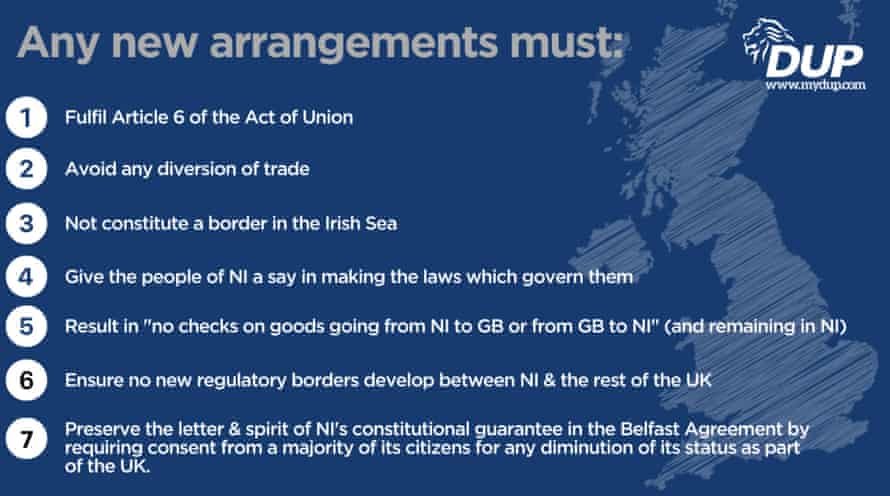
Mel Stride, the Conservative chair of the Commons Treasury committee, has become the latest senior Tory to say there is a case for looking at a windfall tax on energy companies.
Speaking on the Today programme, and referring to an interview yesterday in which Kwasi Kwarteng, the business secretary, said a windfall tax would be a bad idea, Stride said:
I think you have to take a balanced view of all these things, Kwasi’s absolutely right that, in principle, putting up taxes unannounced, effectively, retrospectively, just puts a large sign up that says, ‘it’s not a good place to invest’, and we don’t want to do that.
At the same time, we are in extraordinary circumstances, the supernormal profits that these companies have made are vast, and I personally think there is a case now for looking at a one-off windfall tax and channelling that money in towards those who are really struggling and are bearing the brunt of these cost-of-living challenges.
Robert Halfon, the Tory chair of the education committee, has called for a windfall fax, and William Hague, the former party leader, has said that a tax on a genuine windfall is something Conservative governments have imposed in the past. Last week Rishi Sunak, the chancellor, also indicated that he was not opposed to windfall taxes on principle.
DUP leader Jeffrey Donaldson says he wants 'action' from PM on NI protocol, not just 'words'

The Democratic Unionist party (DUP) will face a familiar choice this week: to trust or not to trust Boris Johnson. Its reward for smoothing his path to the Conservative party leadership and Downing Street has been betrayal. An Irish Sea border would happen over his dead body, he vowed, before signing the Northern Ireland protocol.
When the prime minister meets Sir Jeffrey Donaldson, the MP and DUP leader, at Hillsborough Castle later today he is expected to talk up the pending legislation that would give the UK the right to override parts of the protocol.
Johnson hopes to convince Donaldson that tabling such legislation this week – which will infuriate the EU – is sufficient reason for the DUP to swiftly revive the Stormont assembly and executive.
Donaldson faces a dilemma. Does he believe Johnson will steer the legislation into law, which could take over a year, and actually use it? Or at least use the leverage to extract serious concessions from the EU? If so Donaldson could end the Stormont impasse this week.
Few people in the DUP trust the prime minister. But the party is torn. It is under pressure from a radical right-wing rival, the Traditional Unionist Voice, that will want to see the protocol actually shredded, be it a year or more from now, before any revival of Stormont. On the other hand the longer the impasse lasts the more it will alienate moderate unionists who have been defecting to the centrist Alliance party. Time is not on the DUP’s side. It would be so much easier if they could trust the PM.
Asked on BBC Radio Ulster this morning whether the tabling of legislation will suffice, Donaldson sounded tough but left wiggle room, saying he will judge Johnson on what he does, not what he says. He said:
Words don’t cut it for me. I need action ... I want his words translated into clear action.
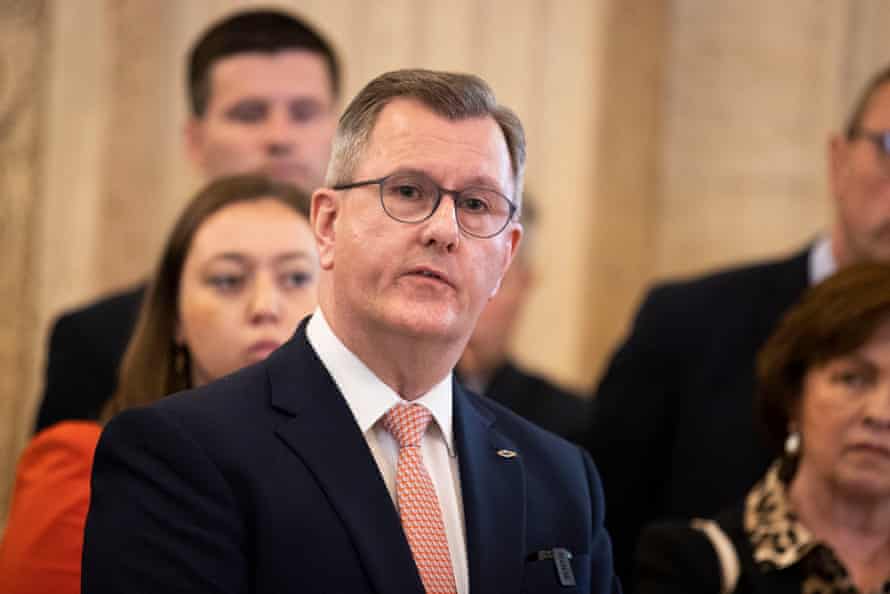
Irish foreign minister says unilateral UK action over NI protocol could affect Brexit trade deal

Ireland’s foreign minister, Simon Coveney, has warned Boris Johnson against any unilateral move to change the Northern Ireland protocol, saying it would call into question the UK’s trade deal with the European Union.
Speaking in Brussels ahead of a meeting with his EU counterparts, Coveney said:
What we can’t do is accept that the British government would act unilaterally, they would pass legislation to effectively breach international law, to set aside elements of a treaty that of course this prime minister was central to designing and putting in place. Because that will cause an awful lot more problems than it will solve.
Unilateral action by the British government “calls into question” the functioning of the UK’s trade and co-operation agreement with the EU, he said.
The Northern Ireland protocol is part of the Brexit withdrawal agreement signed by Johnson in 2019. The Trade and Cooperation Agreement agreed in 2020 by the two sides allows British goods tariff-free access to EU markets.
If the UK overrides some or all of the Northern Ireland protocol, the EU could impose tariffs on British goods or even suspend the entire trade agreement. Diplomats say they need to see the kind of action the UK takes before deciding on the nature and scale of retaliatory action.
The two agreements were linked, Coveney said. Unilateral action against the protocol would only mean “tension, rancour, stand-offs, legal challenge and of course calls into question the functioning of the TCA itself”.
The EU, he said, wanted to be negotiating and discussing with the UK how to respond to the “outstanding issues” of the protocol, including “how we can respond to the unionist community that have been offended by elements of the protocol”.
While acknowledging Unionist concerns, Coveney said “we can’t solely be focusing on one community and one political party”, pointing to the fact a majority of Northern Ireland assembly members backed the protocol. He added:
But that doesn’t mean we shouldn’t accommodate other opinions because Northern Ireland is about compromise.
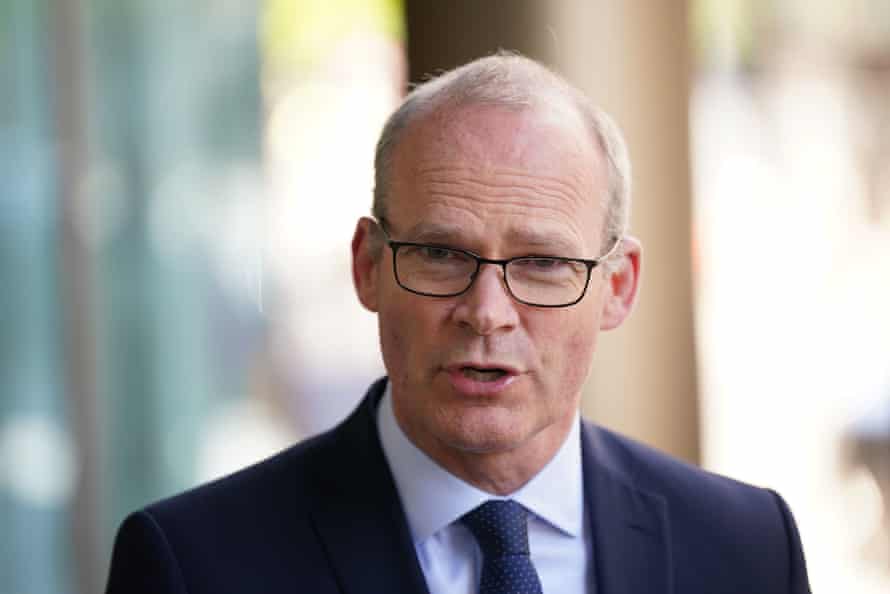
Boris Johnson visits Belfast, saying he does not want to ‘scrap’ NI protocol
Good morning. Most prime ministers over the last 50 years have devoted a considerable amount of their time to Northern Ireland. That has not been true of Boris Johnson, who has never shown great interest in the place and, even when Northern Ireland and the backstop was derailing the Brexit negotiations during Theresa May’s premiership, declared at one meeting: “The Northern Ireland issue is a gnat.”
But today Johnson is visiting Belfast and, ahead of his trip, he has written a surprisingly thorough and considered 2,000-word article for the Belfast Telegraph about the region and its politics. He has tweeted a link.
Today I’m visiting Northern Ireland with a clear message: the UK government will play its part to ensure political peace & democracy, but the parties must come together to restore power sharing and tackle cost of living pressures.
My article in @BelTel:https://t.co/SzOIsJ1dvx
— Boris Johnson (@BorisJohnson) May 16, 2022
His visit takes place a day before a government announcement about legislation that would allow the UK government to abandon parts of the Northern Ireland protocol – a provocative move that has infuriated the EU, since it was first reported about a week ago, and that could theoretically trigger a trade war with the EU. Here is our preview.
But, after days of aggressive sabre rattling from the UK government, Johnson is now adopting a more conciliatory approach in his Belfast Telegraph article. He insists that the UK does not want to scrap the protocol, and that he believes a “sensible landing spot” in the talks with the EU about changes to how it operates is possible. He says:
The protocol was agreed in good faith. And it is why those who want to scrap the protocol, rather than seeking changes, are focusing on the wrong thing ...
There is without question a sensible landing spot in which everyone’s interests are protected. Our shared objective must be to the create the broadest possible cross-community support for a reformed protocol in 2024.
This is quite different from the tone adopted by Liz Truss, the foreign secretary, in recent days. Whether that is because they are engaged in a diplomatic version of the “good cop, bad cop” routine with regards to Brussels, or whether it is because No 10 has belatedly concluded that Truss’s belligerency was counterproductive, is not clear.
I will post more on the article soon.
Here is the agenda for the day.
11.30am: Downing Street holds a lobby briefing.
Labour leader Sir Keir Starmer on ITV talk show Loose Women. In his first Loose Women interview, Sir Keir will be talking about scandals at Westminster and his mother’s arthritis as it will be Arthritis Care Awareness Week.
Afternoon: Johnson holds talks with the Northern Ireland political leaders at Hillsborough Castle. At some point Johnson will also visit Thales, the Northern Ireland defence company that has been producing equipment used in Ukraine.
2.30pm: Michael Gove, the levelling up secretary, takes questions in the Commons.
3.15pm: Andrew Bailey, governor of the Bank of England, gives evidence to the Commons Treasury committee.
After 3.30pm: The Queen’s speech debate resumes, covering education and social care.
I try to monitor the comments below the line (BTL) but it is impossible to read them all. If you have a direct question, do include “Andrew” in it somewhere and I’m more likely to find it. I do try to answer questions, and if they are of general interest, I will post the question and reply above the line (ATL), although I can’t promise to do this for everyone.
If you want to attract my attention quickly, it is probably better to use Twitter. I’m on @AndrewSparrow.
Alternatively, you can email me at andrew.sparrow@theguardian.com.


